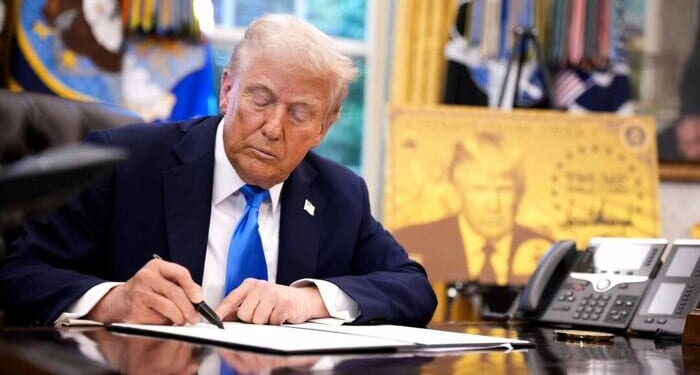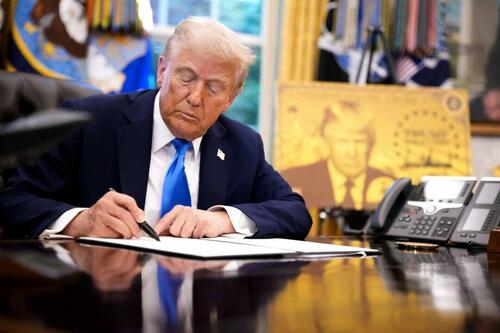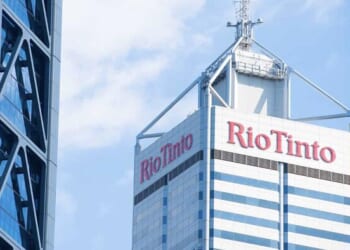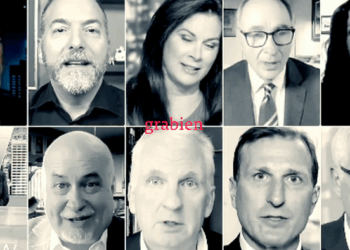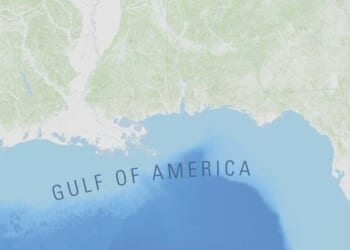Authored by Tom Ozimek via The Epoch Times (emphasis ours),
The federal government has issued new guidance on the Trump administration’s $100,000 H-1B visa fee, outlining payment procedures, eligibility, and limited exemptions under a policy aimed at discouraging the replacement of U.S.-citizen workers with cheaper foreign labor and driving down wages for Americans.
The guidance, published by the U.S. Citizenship and Immigration Services (USCIS) on Oct. 20, marks the first formal implementation document following Trump’s Sept. 19 proclamation establishing the one-time $100,000 fee for new H-1B visa applications.
Trump said in his proclamation that the measure is designed to curb “systemic abuse” of the high-skilled visa system and protect U.S. workers—especially in the fields of science, technology, engineering, and math.
The president alleged that many companies were exploiting existing rules by laying off their U.S.-citizen workforce and replacing them with cheaper H-1B workers. When announcing the changes, Trump told reporters in the Oval Office that their aim was to encourage companies to hire American citizens.
What the Guidance Says
The new USCIS guidance spells out how the rule will work. The $100,000 fee applies to petitions filed on or after Sept. 21 for foreign workers outside the United States who do not already hold a valid H-1B visa. The petitioning employer must make the payment through the federal government’s Pay.gov portal at the time of filing.
Petitions filed before Sept. 21 are exempt, as are those seeking amendments, extensions, or changes of status for workers already in the United States, provided the requests are approved. The fee also applies to petitions requesting consular or port-of-entry notification for workers abroad.
Employers must include proof of the fee payment when filing, and any petition submitted without that confirmation will be denied, USCIS said.
While the new guidance does not address who bears the cost of the $100,000 visa fee, federal labor rules prohibit employers from passing USCIS petition fees to workers. A Labor Department fact sheet states that H-1B employees “can never be required to pay” statutory processing or filing fees, which are considered employer expenses.
USCIS also noted in the new guidelines that a worker whose petition for a change or extension is approved inside the country will not become subject to the $100,000 payment, even if they later depart and apply for a visa abroad or re-enter using a current H-1B visa based on the approved petition.
Exceptions Are ‘Extraordinarily Rare’
Waivers of the $100,000 fee may be granted only in “extraordinarily rare circumstances,” according to USCIS. To qualify, the secretary of Homeland Security must determine that employing the foreign worker is in the national interest and that no qualified American worker is available for the position.
Also, a determination must be made that the foreign worker does not pose a security or welfare threat, and that requiring the payment would “significantly” undermine U.S. interests.
USCIS said such exemptions are decided at the discretion of the Secretary of Homeland Security and may be granted only in extraordinarily rare cases.
The new guidance does not change the annual H-1B visa cap—65,000 regular visas and 20,000 for U.S. advanced-degree holders—but adds significant cost for employers seeking to import foreign workers.
Legal Challenges Mount
Two major lawsuits have been filed seeking to block Trump’s $100,000 H-1B visa fee.
A coalition of labor unions, health care providers, religious groups, and university professors sued on Oct. 3 in federal court in Northern California, arguing the president exceeded his constitutional authority and displaced the visa framework created by Congress.
The complaint, filed by the Democracy Forward Foundation, says the policy will harm hospitals, churches, and universities that depend on foreign professionals.
The U.S. Chamber of Commerce followed with its own lawsuit, characterizing the fee as federal overreach that would make participation in the H-1B program cost-prohibitive for small and midsize employers.
“The new $100,000 visa fee will make it cost-prohibitive for U.S. employers, especially start-ups and small and midsize businesses, to utilize the H-1B program, which was created by Congress expressly to ensure that American businesses of all sizes can access the global talent they need to grow their operations here in the U.S.,” Neil Bradley, the chamber’s chief policy officer, said in a statement.
While Bradley praised Trump’s “ambitious agenda of securing permanent pro-growth tax reforms, unleashing American energy, and unraveling the overregulation that has stifled growth,” he said that the U.S. economy will “require more workers, not fewer,” to support this agenda.
The White House has defended the rule, with spokesman Taylor Rogers telling CBS News it discourages companies from “spamming the system and driving down American wages” while protecting opportunities for U.S. workers.
Loading recommendations…

